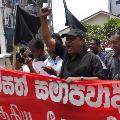
‘Death of Democracy’ in Sri Lanka
September 8th, 2010 will be marked as a ‘Black Day’ in the history of the capitalist democratic system in Sri Lanka.
On that day, the Rajapakse government passed the 18th amendment to the constitution of Sri Lanka. Despite all the burning issues of the working class and other oppressed people, including the Tamil community in the north and east, the government passed the 18th amendment as an emergency bill in the Sri Lanka parliament.
The Government brought this amendment to the constitution mainly to remove the two-term limit imposed on a person who has held office as president.
The Rajapakse government did not have the two-thirds majority in the parliament needed to pass a constitutional amendment. To achieve the required number of votes, government forces used various tactics to bribe opposition MPs from the United National Party, the Muslim Congress and the Tamil National Alliance. Seventeen MPs from the opposition parties voted for the amendment mainly for various personal benefits.

The biggest betrayal was carried out by the leaders of what remains of the once-large traditional left parties – the Lanka Sama Samaja Party (LSSP), the Communist Party of Sri Lanka (CP) plus the small Democratic Left Front (DLF) led by Vasudeva Nanayakkara. These are all part of the present government along with Rajapakse’s Sri Lanka Freedom Party (SLFP). During each and every past election, the SLFP and these so-called left parties promised the people of Sri Lanka that they would abolish the Executive Presidency system, which was introduced by the JR Jayawardene government back in 1978.

Betraying the entire oppressed people in Sri Lanka, the leaders of these three parties voted in parliament for this dictatorial amendment. This was in blatant defiance of the decisions made by the central committees and political bureaus of these parties to fight in parliament against the strengthening the presidential system. This is another instance of them showing their cowardly opportunistic politics.

Forces against the 18th amendment declared September 8th as a ‘Day of National Protest’. On September 7th and 8th in Colombo, all opposition parties, trade unions, and civil organisations collectively launched a massive protest against the efforts of the government preparing a constitutional and legal framework to establish a dictatorial regime in Sri Lanka. During these two days, tens of thousands of people gathered in Colombo and took part in anti-government rallies, marches etc.

On September 8th, the government brought its followers to Colombo to support the proposed amendment. People from various parts of the island were brought to Colombo in government-financed transport. Additionally, Police and military forces were mobilised heavily to stop the peaceful protests.

However, those forces who fight to defend democratic rights in Sri Lanka were able to defeat the government’s efforts to stop the democratic protest against it and make the day of national protest successful.


Be the first to comment